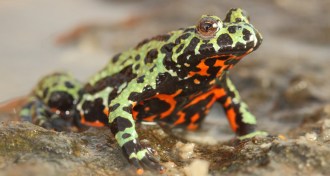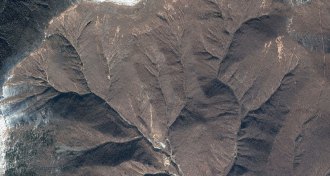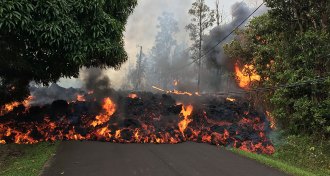Uncategorized
-
 Astronomy
AstronomyThe recipes for solar system formation are getting a rewrite
A new understanding of exoplanets and their stars is rewriting the recipes for planet formation.
-
 Animals
AnimalsThese caterpillars march. They fluff. They scare London.
Oak processionary moths have invaded England and threatened the pleasure of spring breezes.
By Susan Milius and Aimee Cunningham -
 Animals
AnimalsA deadly frog-killing fungus probably originated in East Asia
The disastrous form of Bd chytrid fungus could have popped up just 50 to 120 years ago.
By Susan Milius -
 Astronomy
AstronomyFirst 3-D map of a gas cloud in space shows it’s flat like a pancake
An interstellar gas cloud dubbed the Dark Doodad Nebula looks like a wispy, thin cylinder. But it’s actually a flat sheet.
-
 Earth
EarthSatellite data backs theory of North Korean nuclear site collapse
After North Korea’s most recent nuclear test, two underground cave-ins occurred, possibly rendering the facility unusable, a new study suggests.
-
 Life
LifeThere’s a genetic explanation for why warmer nests turn turtles female
Scientists have found a temperature-responsive gene that controls young turtles’ sex fate.
-
 Particle Physics
Particle PhysicsThe proton’s weak side is just as feeble as physicists thought
Scientists make the most precise measurement yet of the proton’s weak charge and find it agrees with predictions.
-
 Artificial Intelligence
Artificial IntelligenceThis AI uses the same kind of brain wiring as mammals to navigate
This AI creates mental maps of its environment much like mammals do.
-
 Astronomy
AstronomyGaia delivers a trove of data revealing secrets of the Milky Way
Astronomers are already using Gaia’s new information to estimate the galaxy’s mass, the diameter of exoplanets and more.
-
 Earth
EarthHow long will Kilauea’s eruption last?
A volcanologist with the U.S. Geological Survey answers burning questions about the ongoing Kilauea eruption.
-
 Math
MathReal numbers don’t cut it in the real world, this physicist argues
Physicist Nicolas Gisin argues that real numbers don’t properly represent the natural world, which is a good thing for free will.
-
 Astronomy
AstronomyNew ideas about how stars die help solve a decades-old mystery
New ideas about stellar evolution help explain why astronomers see so many bright planetary nebulae where they ought not be.